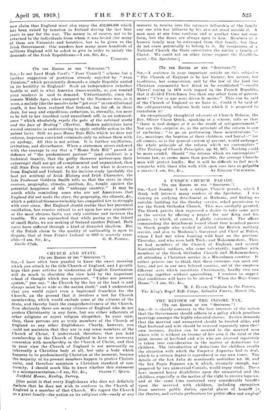CHURCH AND STATE.
fTo THE EDITOR OF THE " SPECTATOR.") SIR,—I have often been puzzled to know the exact meaning which you attach to the title Church of England, and I greatly hope that your articles in vindication of English Erastianism will do much to elucidate the view held by the important school of thought which you represent. "Under our present system," you say, " the Church by the law of the land is and always must be as wide as the nation itself," and I understand that you would reject even a baptismal franchise for the Church, on the ground that it involves a test for Church membership, which would exclude some of the citizens of the State, and thereby limit the comprehensiveness of the Church. Nov obviously there are many citizens of England who do not profess Christianity in any form, but are either adherents of other religions or reject religion altogether. In your view, then, these persons are as truly members of the Church of England as any other Englishman. Clearly, however, you .could not maintain that they are in any sense members of the Church of Christ. I understand, therefore, that you hold membership in the Church of England to have no necessary connexion with membership in the Church of Christ, and that in your view the Church of England is not necessarily or inherently a Christian body at all, but only a body which happens to he predominantly Christian at the moment, because the majority of its present members happen to profess Christi- anity, and therefore maintain is Christian standard of con- formity. I should much like to know whether this statement is II misrepresentation.--I am, Sir, dc., OLIVER QuIcx. . Nuffield House, Henley, Surrey.
[Our point is that every Englishman who does not definitely declare that he does not wish to conform to the Church of England is a member of that Church. We regard the ChUrch as a great family—the nation'on its religions side—ready at any moment to receive into the intimate fellowship of the family any one who has hitherto by his own net stood outside it. A man may at one time conform and at another time not con- form, but the doors are always open to him. Members of X human family may be estranged from that fussily, but they do not cease potentially to belong to it. Ity recognition of a National Church the State constitutes the nation a family of Christ. We could not ou other terms support the Estalilishs went.—Ea. Spectator.]






































 Previous page
Previous page